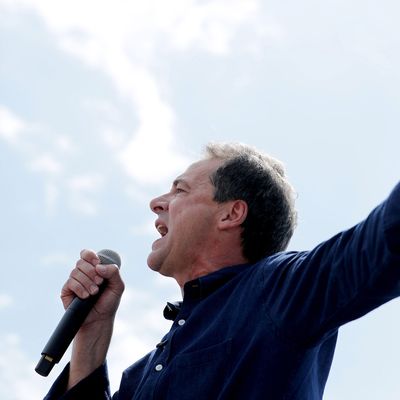
Now that Tulsi Gabbard has ended her boycott threat, we know that there will be 12 Democratic presidential candidates on the debate stage in Westerville, Ohio, tonight, a record crowd (yes, there were 20 debate qualifiers in June and July, but they were deployed over two nights). But it’s probably more surprising that there are seven other active candidates legitimate enough to make major media lists who will not be on the stage — and are very unlikely to meet the tougher criteria for the November and subsequent debates — who are nonetheless still in the field.
Now the term “active” is questionable for some of these birds:
Messam hasn’t even made some lists and has been on others because, well, he’s an elected official, not some random schmo claiming to run for president to advertise his dry-cleaning business or whatever. The city of which he is mayor, Miramar, Florida, is actually larger that Pete Buttigieg’s South Bend. But he hasn’t come within a mile of a debate stage. Nor has former congressman and retired admiral Joe Sestak, who has been in the race since June but hasn’t made much of an impression.
There are five others, though, who did make the June and July debates, but none since then, and haven’t dropped out. Of these, author and self-help guru Marianne Williamson has shown some grassroots fundraising chops (she met the donor threshold for tonight’s debate, but only had one qualifying poll); she raised a non-negligible $3.1 million in the third quarter, double her second-quarter haul. There are two barely surviving candidates with fine résumés and theoretical paths to the nomination if Joe Biden ever crashed and burned: the self-styled moderates Colorado senator Michael Bennet and Montana governor Steve Bullock. Congressman John Delaney is kind of sui generis: His personal wealth makes fundraising for anything other than debate qualification largely unnecessary, but he’s been in the race longer than anyone and had one debate (in July) in which he got lots of exposure — yet still is in nowheresville in terms of measurable support. He’s said he’ll stay in until Iowa no matter what.
When Ohio congressman Tim Ryan suspended his campaign in the wake of the Dayton shootings in August, a lot of people figured he’d be formally out of the race before long. But he hasn’t dropped out, technically, though he’s simultaneously running a House reelection campaign.
Ryan’s willingness to do that separates him from four of the six candidates (I won’t even count insta-in, insta-out Richard Ojeda) who have indeed already dropped out: Eric Swalwell and Seth Moulton quit the presidential trail to head off challenges to their House seats; Jay Inslee decided to run for reelection as governor of Washington; and John Hickenlooper finally got talked into running for the Senate. Kirsten Gillibrand basically ran out of money, and it’s probably fair to say that her fellow New Yorker Bill de Blasio was laughed out of the race.
So looking at the slow-bleeding survivors, it seems none of them (other than the aforementioned Ryan) face any choices of other things to run for in 2020 (Bullock, like Beto O’Rourke, has made it abundantly clear he’s not going to go Hickenlooper’s path of down-shifting to a Senate race). Bennet, Williamson, and Delaney have enough money to keep puttering along. And Messam and Sestak don’t really have campaigns visible enough to shut down, so why bother?
This is pure speculation, but you also have to figure the recent instability of the political climate could be a factor in keeping marginal candidacies alive. Bernie Sanders’s heart attack and the sudden focus of an impeachment inquiry on Trumpian misconduct related to claims of Biden corruption may have some campaigns pausing on the threshold of the exit door, waiting to see if the field gets turned upside down. And in the end, there’s no accounting for what happens to people when they keep seeing the next president of the United States in the mirror. Surely others will see it eventually, won’t they? — so reason those who refuse to be winnowed.






























